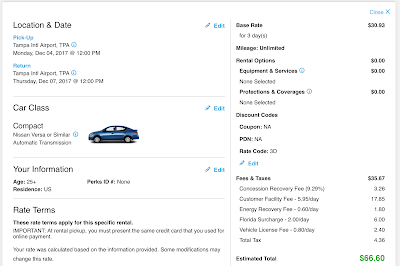As the Tampa Bay elites continue to scheme behind the scenes to "invest" in
our their future, they implicitly acknowledge they don't have a good way to pay for their plans. Multiple referendums and plans to raise taxes for transportation have failed, while we are struggling to pay for the necessary improvements for water and sewer infrastructure.
Recently the news of the Rays have expressed an interest in relocating from St. Petersburg to Ybor City, with an estimated price tag of $800 million, with $650 million expected to be financed somehow. Even Tampa mayor Bob Buckhorn has no idea on how to pay for it, previously stating Tampa has no money.
But we can always to get someone else to pay for their schemes, right?
Hence, get prepared to hear plans how we can make someone else pay for it by raising hotel and rental car taxes -- make our visitors pay.
It's one of the oldest tricks in the tax raising books, and not solely the domain of Tampa Bay.
But we are already maxing out these taxes, which are already among the highest in Florida.
For example, to help pay for the Tampa International Airport "expansion" for zero net new passenger capacity, rental car surcharges were increased to the point that in some cases, the fees and taxes can exceed 100% on a 3 day car rental!
 |
| Payless rental from TIA with fees and taxes over 100% |
The above screen shot shows a 3 day compact car rental booking from paylesscar.com, with a base rental rate for $30.93 for 3 days, and $35.67 in fees and taxes, for 115% fee and tax rate.
This is not unique to Tampa, as Miami airport is just under 100% for the same rental. However, Tampa does have the highest daily Customer Facility Fee at $5.95. compared to $3.26 at Orlando and $4.85 in Miami. There are some variance in the municipalities on the other taxes and fees, notably the Concession Recovery Fee, which Tampa at 9.29% is the lowest and Miami at 11% is the highest. A 9.29% tax is a good thing?
As a "smoke test" on the rental car fees and taxes, we note that the state and federal taxes in Florida are
$1.34 per pack of cigarettes, in addition to the
federal tax of $1.01 per pack, which purchase price averages around
$6.30 per pack, for a mere 37% tax.
However, all this begs the question... How much more can we tax them?
Not to mention rental car companies are getting
disrupted by ride sharing such as Uber and Lyft.
A new study out Thursday that tracks transportation choices by U.S. business travelers finds that travel by Uber, the ride-hailing startup, has surpassed rental cars. Uber accounted for 43 percent of ground transportation transactions, while rental cars had 40 percent. Led by Uber and Lyft, ride-hailing services surpassed rental cars for the first time in the fourth quarter of 2015 and have since widened their lead.
[snip]
The Certify study finds rental car transactions have fallen 15 percentage points in two years while taxis have dropped even more, by 23 percentage points over the same period. Taxis accounted for 14 percent of ground transportation transactions in the first quarter of 2016.
As we spend $1 billion on the airport Phase 1 (!), including a massive new rental car center complete with a $417 million people mover, the $5.95 daily Customer Facility Fee is expected to help recover those costs.
But with car rentals trending down, and already taxed to the max, its unclear how much increasing taxes and fees will cover costs, much less pay for more investments for
us our elites.
Of course, our leaders now how to fix that.
Add more fees... on Uber and Lyft.
The Hillsborough County Aviation Authority board of directors approved contracts with rideshare companies Uber, Lyft and Wingz Thursday morning to drop off and pick up passengers at the airport. In agreeing to the contract, rideshare drivers will pay a per-trip fee of $3 for each ride beginning this month.
The board approved a new user fee system to charge limos, taxis and rideshare companies per trip at the June board of directors meeting. User fees for ground transportation is used at many other major airports, including Orlando International Airport. The fees will rise each year, eventually to $5 a trip, in the third year.
Will it ever stop?
Perhaps there is a
little hope.
In a possible blow to financing a new Tampa Bay Rays stadium in Hillsborough County, Florida House Speaker Richard Corcoran filed a lawsuit against the city of Tampa for what he called an "illegal tax" on hotel rooms.
Hillsborough County already charges 12% hotel taxes, among the highest in the state. Tampa started assessing $1.50 fee for Ybor City and Tampa hotels to further support marketing efforts, raising around $1 million per year. With some hope, of course, to expand into Hillsborough County.
If Corcoran's law suit is successful, it may hinder plans for the Rays.
That's because the financing of a new stadium may rely on another source of revenue, an entertainment tax, that could be levied on parts of the county that teem with nightlife and leisure activities. The $1.50 assessment is similar in that it is only charged in Ybor and downtown Tampa.
So far, no public funding for the Rays has been identified, and local support for increased taxes is non-existent. It is still early in the Rays relocation saga, so we are far from understanding what the Rays relocation taxing team will try next.
We are at the limit for what we are taxed for already, still waiting for roads, storm drainage and sewer fixes, while the elites are strategizing to tax us for their benefits.
The one thing we do know -- they will not give up trying to get them to pay for their profit.
But to the elites, "them" is you.













